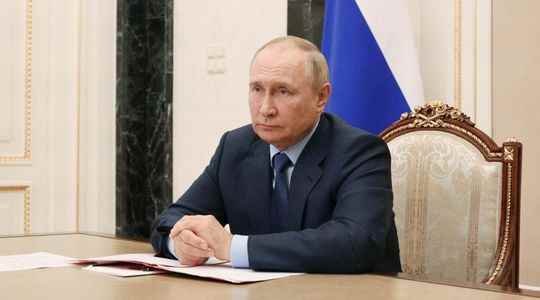Vladimir Putin raises his voice. During an economic forum in Vladivostok, in the Russian Far East, the Russian president threatened this Wednesday, September 7 to cease all delivery of hydrocarbons in the event of a price cap, while denying the use of energy as a “weapon” against Europe, which fears shortages.
Last week, the G7 countries said they wanted to “urgently” implement a cap on the price of Russian oil, encouraging a “broad coalition” of countries to participate in it, in retaliation for the offensive in Ukraine. This proposal was also formulated this Wednesday by the President of the European Commission, Ursula von der Leyen, during a press conference, in order to “reduce the income” used by the Kremlin to “finance this atrocious war against Ukraine “.
But this Wednesday, Vladimir Putin wanted to be clear: Russia will no longer deliver oil or gas to countries that would cap the price of hydrocarbons sold by Moscow. Such an initiative by the EU would be “an absolutely stupid decision”, “a stupidity”, launched the master of the Kremlin. “If European countries want to give up their competitive advantages, it’s up to them to decide,” he warned. But “we will deliver nothing at all if it is contrary to our interests, in this case economic. Neither gas, nor oil, nor coal (…). Nothing”, he added, in a firm tone. .
“We will not supply anything outside the framework of the contracts” signed with the importing countries, Vladimir Putin again affirmed in front of several Russian and Asian economic leaders, castigating “those who try to dictate their own will to us”.
“Astronomical prices and enormous market volatility”
A little later in the day, the European Commission presented its ideas for reducing the energy bills of Europeans, proposing to cap the income of electricity producers based on nuclear and renewable sources, while deducting a share of the profits from gas and oil groups. “At the beginning of the war, Russian gas by pipeline accounted for 40% of all gas imported by the EU. Today, it only represents 9%”, underlined the President of the European Commission, Ursula von der Leyen.
“Households and businesses are faced with astronomical prices and enormous market volatility” for electricity, whose prices are indexed to gas prices, noted Ursula von der Leyen.
Some electricity producers, which mobilize nuclear power plants, wind power, solar power or hydroelectric dams, “realize massive revenues which do not reflect their production costs” which are “low”, lamented Ursula von der Leyen. She called for redistributing these “unexpected profits” to help “vulnerable” households and businesses.
“Smart demand reduction”
The European Commission is also aiming for “intelligent demand reduction”, with “a mandatory target for reduce electricity consumption rush hour”.
Producers and distributors of gas and oil, who are making “massive profits” thanks to soaring world prices, are also in the sights of Brussels. “We are going to propose a solidarity contribution for fossil fuel companies, because all energy sources must contribute to solving this crisis”, indicated the president of the European executive. Member States could use this financial windfall to help consumers but also to invest in clean energy sources.
Czech Trade and Industry Minister Jozef Sikela, whose country holds the rotating EU Council presidency, criticized the idea of capping the price of Russian gas. “It is not a constructive proposal. It is more another form of sanction against Russia rather than a real solution to the energy crisis in Europe,” he said, calling for a decoupling rapid rise in electricity and gas prices.
Brussels is also proposing a support mechanism for energy suppliers lacking liquidity in the face of the mad volatility of world markets, by updating EU regulations to allow member states to quickly provide public guarantees to the companies concerned.
It is in this context of arm wrestling that Russia announced last week the closure of the valves of the Nord Stream gas pipeline, which serves Germany and several European countries, citing technical reasons. According to the Russian giant Gazprom, this prolonged interruption is due to the need to repair a gas pipeline turbine. This decision reinforced the fears of European countries of a total cut off of Russian gas to the continent at the approach of winter and against a background of galloping inflation of energy prices.
